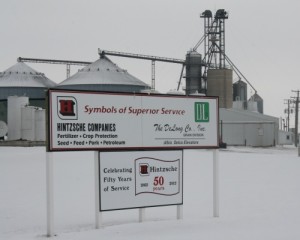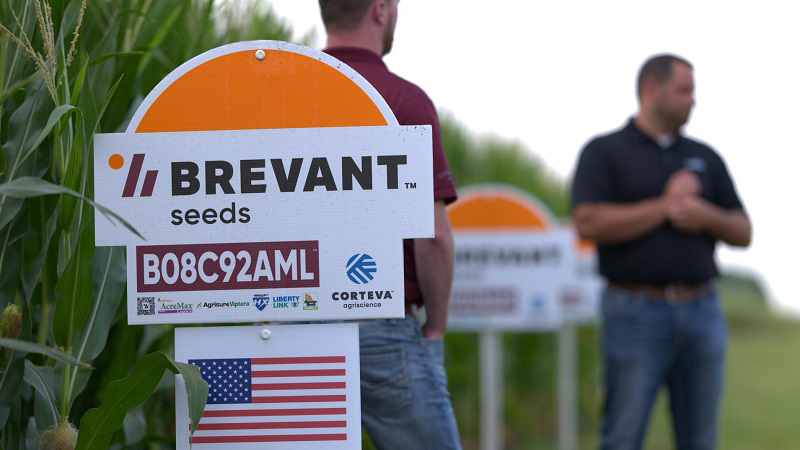Hintzsche: An Untraditional Family Business
 From the minute one ducks inside its Maple Park, IL, headquarters, it’s clear that Hintzsche Fertilizer Inc. is doing a traditional family business on a larger scale – and with much success.
From the minute one ducks inside its Maple Park, IL, headquarters, it’s clear that Hintzsche Fertilizer Inc. is doing a traditional family business on a larger scale – and with much success.
It starts at the very top with CEO and president David Hintzsche’s approachable, seemingly easy-going manner and trickles down throughout the organization, from Ron Hintzsche and his gregarious crew in the northernmost reaches of Hintzsche’s territory in Kirkland, IL, down to new Burroughs Ag Services general manager Daniel Leifker and seed manager Craig Oest and their more southerly locations, acquired by Hintzsche in 2011.
Founded in 1962 as a feed and grain partnership by two young DeKalb, IL, farm brothers, Rich and Ken Hintzsche, the No. 40-ranked retailer on our 2012 CropLife 100 list has developed rapidly over the last few years via aggressive expansion throughout its trade area west of the sprawling Chicagoland Metro area.
The company’s era of expansion has been ongoing since the beginning. In 1995 when Rich and Ken retired, the two brother’s six sons continued the legacy as a second-generation family business. A new board of directors was formed shortly thereafter, and continues to this day. What started as one Hintzsche Feed & Grain location at Maple Park now boasts 14 agronomy retail locations following the acquisition of Walter Seed and Fertilizer, Grand Ridge, IL, in February.
“Our business is about selling value, working with our customers to improve their yields and maintaining an open and honest philosophy in everything we do,� says Dave Hintzsche. “It is all about making sure we remain the trusted advisor to our customers.�
The War for Talent Rages
Across the board, every member of Hintzsche’s leadership team responded the same way when asked what the retailer’s most daunting challenge is: Securing and keeping qualified personnel.
“One of the biggest issues we face as an industry is people,� says Jeff Eggleston, general manager. “When I started here seven years ago, trying to find qualified people in this industry was a little difficult, but it’s getting much easier.
“Today, and I think this may have to do with the fact that agriculture is kind of the ‘in thing’ these days,� he continues, “the universities are really turning out some good candidates, and that has helped us tremendously. It’s always going to be a challenge to find people that understand our service philosophy and are willing to take the time necessary to develop customer relationships.�
From his perspective, Dave Hintzsche sees the issue as a generational one.
“The group of potential employees that’s in their forties now is far less than in previous decades. They were raised in the 1970s and 80s, a time when agriculture was really struggling, so many farmers encouraged their kids to go do anything other than farming,� says Hintzsche. “So now there’s a real gap between the older generation who is approaching retirement age and the new college graduates. It’s both an industry and a population problem.�
“Another issue is dealing with the Millennial generation,� adds Eggleston. “Millennials tend to have a slightly different work philosophy than the Baby Boomers, and employers need to remain open minded and realize there is more than one way to do things. It’s important to accept these differences and to integrate both generations in order to be successful.�
Hintzsche has done its due diligence in attracting newer candidates with seed division manager Craig Oest, CFO Matt Croll and Burroughs Ag Services general manager Daniel Leifker all stepping into leadership positions within the company in the past year. Leifker himself has some pretty big shoes to fill down at Burroughs, as he takes over for the previous general manager who had been there for 30-plus years.
“We’ve got a nice team of young managers in place that we really feel good about,� says Hintzsche.
“One of the many ways that Hintzsche attracts young employees is its company-wide philosophy of open communication,� says Eggleston.
“We strive to make sure that all employees know how we’re performing as a company at all times, from the operators, to the sales reps, to the people in the office my message has always been clear: every employee can make a difference. Now, due to the nature of their position, some employees can make a bigger difference than others, but every employee can help in some way. Sometimes, just a simple ‘thank you’ to our customers or fellow employees can do wonders.
“As we go forward in our pursuit to find and relocate quality people, we have to keep the state of our economy in mind,â€� he adds. “With the current housing market, we’re going to struggle to attract quality people because many of them are upside down on their mortgages and that’s an issue the entire nation is facing. The way I look at it is if we’re willing to recruit the best people for the job, then we’re going to have to be flexible and more innovative in the foreseeable future until the housing market recovers.”
Growing Like A Weed
While Hintzsche continues to grow its pork and petroleum divisions, its “core bread and butter� remains its agronomy business.
Acquired in 2011, Burroughs Ag Service’s eight retail locations throughout north-central Illinois continue to operate under the Burroughs name as a wholly owned subsidiary of Hintzsche Fertilizer, Inc.
“Burroughs has a really good image in the area,� explains Leifker. “It’s a local name that’s always been around and it gives the company that local feel that people really like.�
“The timing of the Burroughs acquisition and expansion of our business was perfect,� adds Eggleston. “It has been very well received by both customers and employees, and has been a positive move for the Hintzsche companies.
“We were also very fortunate (during the acquisition) to have a solid transition team in place – John Turini (former general manager) stayed for a little bit over a year,� he continues. “I would say the transition at Burroughs was one of the best that I’ve ever been involved with. We didn’t have any people issues or customer issues – and part of that has to do with how we approached the initial integration. We have really given them the freedom to operate their plants without imposing a lot of changes. Often times, when one company buys another company, the purchasing company immediately implements a number of changes in policies and procedures, but we chose not to do that during the Burroughs acquisition.�
While the value of the Burroughs name was a primary catalyst for Hintzsche allowing it to retain its brand distinction, another was the fundamental difference in how the two organizations (now one) conduct business. For example, Hintzsche is primarily known for its blended suspension fertilizer products, while growers in the Burroughs territory apply more anhydrous ammonia and conventional dry fertilizers on their fields than Hintzsche growers do.
“When we were discussing the acquisition, I remember saying ‘Look, let’s let them operate and learn the business on their own, because their business model is different than ours at Hintzsche,’â€� says Eggleston. “Now, are there some things they are doing there that we’ve integrated into the business up here? Sure. And there are some things we’re doing at Hintzsche that they are integrating down there.”
As Dave Hintzsche recalls, another aspect that initially made Burroughs attractive was the fact that the bulk of its trade area ran adjacent to the Illinois River, a valuable strategic waterway for moving product up from the Mississippi River Valley and into central Illinois, giving Hintzsche what it now refers to as its “NPK river terminal� for fertilizer logistics.
The two company’s long histories of family ownership also made them ideal partners, says Craig Oest, seed division manager at both Hintzsche and Burroughs.
“There’s just an overall feeling of family that pervades the atmosphere at both companies,� says Oest. “You just don’t see that sense of pride that everybody shares at a family business, everywhere you work. I think both companies have been an excellent fit for each other and a lot of that success can be attributed to the family atmosphere here.�
Recently acquired Walter Seed and Fertilizer, Inc., is yet another family business to join the Hintzsche ranks. Like Hintzsche, Walter is the product of a partnership between two brothers, John and Roger Walter, started some 40 years ago.
“We are excited about this opportunity and look forward to the expansion of our business and the synergies it will provide,” says Hintzsche. “Our ultimate goal is to gain the trust and respect of the Walter growers, and provide them with excellent products and services now and in the future.”
As they continue to explore new avenues and opportunities for growth, Eggleston says it’s important for the company to manage growth in a manner that allows us them to meet or exceed both strategic and financial objectives.
“Hintzsche is growing but we’re still not one of the big boys,� he says. “You start looking at companies with 700-800 locations, and you will realize there’s a big gap between us and them. But our smaller size allows us to provide the customer service, the ability to quickly respond to changing customer needs, and the personal touch that sets us apart from our competition.
“Now, I don’t know what the optimum size is (for Hintzsche), but I think we can expand more before we risk losing sight of our customers. We’re still about people.�
Finding Value
Like any retailer in any industry, much of Hintzsche’s day-to-day is spent finding value for its grower-customer.
“In this fertilizer market you generally know where your competitors are at with pricing, and you’ve got to remain competitive, says Eggleston. “There are times, though, when we’re just not able to be that cheap. And that’s where our level of service comes in.
“Product availability is also very important in our industry,� he adds. “As a retailer, you can’t invest in the storage facilities necessary to take possession, the inventory to fill those facilities, have that fertilizer when and where the grower wants it, and still match every cheap price that’s in the market. It just won’t work.�
Additionally, managing price risk on fertilizer is an ongoing project at Hintzsche. “The other thing that has changed in the market during the past five years is contracting our fertilizer sales,� says Eggleston. “Our system and methodology on fertilizer contracting is a work in progress and we will continue to refine it until it’s as customer friendly as possible. We’ve also got to find the balance between price protection and risk. What it usually comes down to is: ‘If something helps the customer and won’t hurt Hintzsche, we’re all for it.’
“Another aspect of this business that warrants keeping an eye on are the number of nitrogen production facilities that are either currently under construction or in the planning stages,� Eggleston adds. “That’s going to have the potential to provide additional volatility in the nitrogen market.�
Increased regulation on fertilizer, especially in Illinois and other states adjacent to the Mississippi River Basin, is another issue on Hintzsche’s radar.
“Being as involved as I am in the IFCA (Illinois Fertilizer and Chemical Association), I would think the fertilizer industry as a whole is going to see increased regulation,� says Eggleston. “I am most concerned with what regulations we are going to see with fall-applied nitrogen and phosphates. Will it be a complete elimination? We don’t know, but I suspect it may be more of a reduced or a limited practice in the future, and it will be based upon soil type or soil test.�
Spotlight On Seed
Personnel and fertilizer supply issues aren’t the only concerns at Hintzsche. With the September 2012 launch of Axis Seed Direct, an independently operating, wholly-owned seed subsidiary of Hintzsche, seed is taking some of the spotlight as well.
Hintzsche began offering seed to its customers in 1996 and its retail seed division has grown into a significant revenue generator. The company has been a DeKalb/Asgrow dealer from the start, and along the way LG, Croplan, and, most recently, Axis have been added to the portfolio.
“Seed helps us enhance our trusted advisor role and seed decisions place us at the table in the beginning of the crop planning cycle, as it is often an early and key decision on each and every grower’s field,� says Hintzsche.
Hintzsche uses its Seed Selector Pro program, a component of its Yieldmaster agronomic decision support system to help place the right hybrid in the right field. Variable rate seeding is becoming more commonplace along with on the go “Learning Blocks� to help growers test new prescriptions.
“We feel that our customers are tremendously excited to have another option now when it comes to their seed,� says Andy Paulson, Axis Seed Direct general manager. “The differentiation point between our retail seed division and the regional seed company, Axis Direct, is that the seed division still has the ability to have choice of product from the current suppliers that they work with, and they’re also a dealer for Axis seed now.
“With Axis seed, we actually have the ability to background products from all genetic providers ourselves, and choose the best genetics for our chosen geography and then produce it, have better control of our inventory and make sure that we’re offering the best product for our specific geography.�
“The Axis Seed Brand will make a nice companion brand along with our lead brands of DeKalb and Asgrow, adds Seed Division Manager Craig Oest. “This will also help to round out our multiple brand strategy. The brands of DeKalb, Asgrow, LG Seed and Axis Seed give us and our customers excellent choices for their farming operations.�
A Cautious Future
With agriculture currently in the midst of an unprecedented hot streak, nearly everyone in the industry is wondering just how long the ride can last.
“This high priced corn has really put some pressure on margins, but as a retailer we truly have a foot in both camps,� says Hintzsche. “On one hand, we’re cheering our grain customers on because high priced corn is a good thing for them, but then when we’re on the other side of it, buying feed corn for our pork operations, it’s not such a good thing.
“One of my big concerns, and we started to talk with our employees about this last year, is that we have seen some pretty good times for both the farmer and the dealer over the last few years, but if we get off to a really good start with a crop, like we did last year before the drought hit, we could see a record crop and depressed prices. Farmer’s profit margins could even go negative for a while.
“As we look to this year, if we raise a big crop, and we’ve already got some ethanol plants shut down and some feed operations down, we probably have a higher risk of overproducing than we did last year. And that’s not a good thing long term. I think we’d all like to get out of this volatility.�
Eggleston agrees with that outlook, to a point.
“I think that the markets may have reached a new plateau,� says Eggleston. “Will the profitability at the grower level maintain what we’ve had these last couple years? I don’t know, but I think the progressive farmers that use technology and stay on top of their business will continue to make money.�
And you can bet top dollar that, as it has been for the past 50 years, Hintzsche will continue to be the grower’s trusted advisor for another 50 years.






